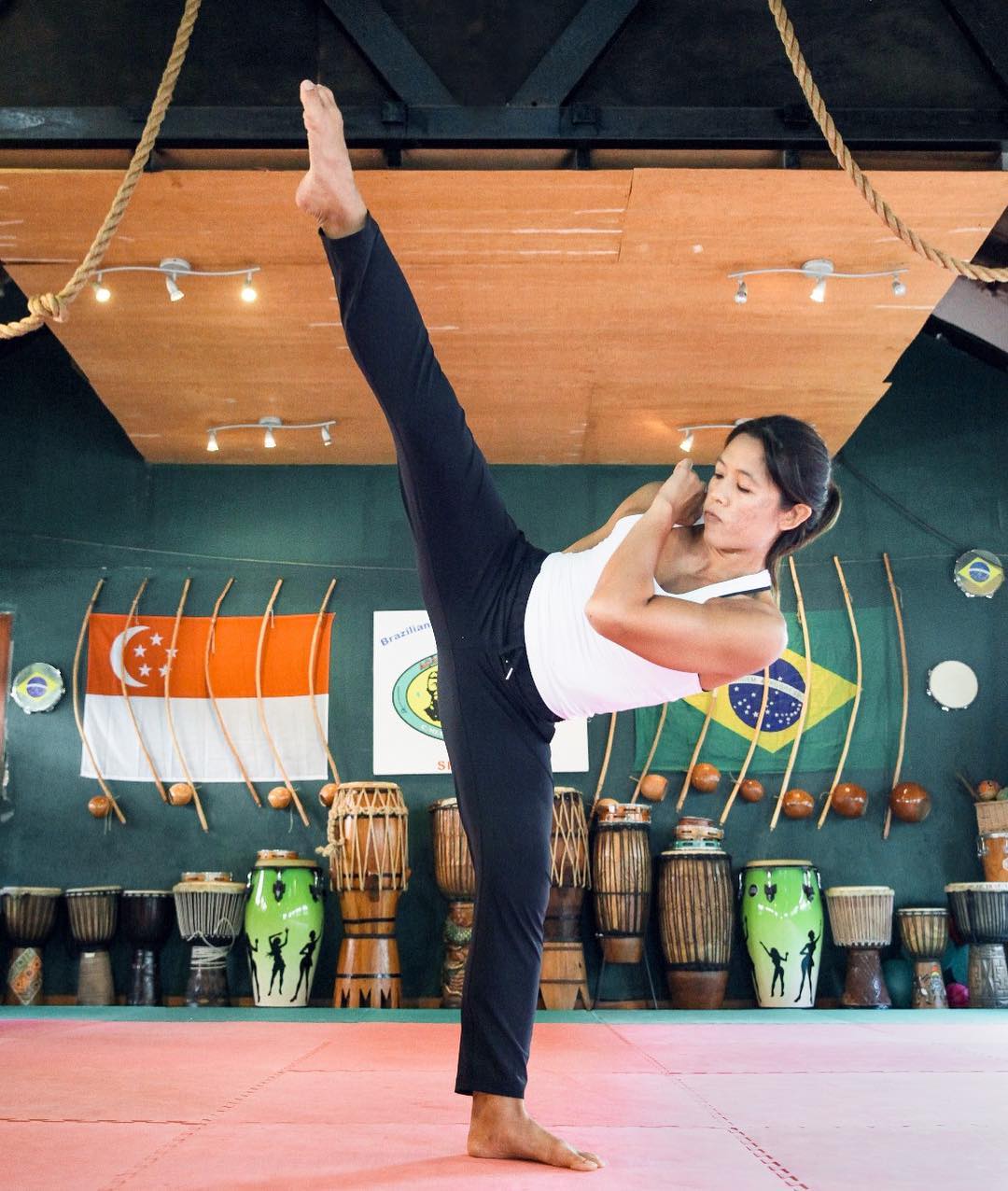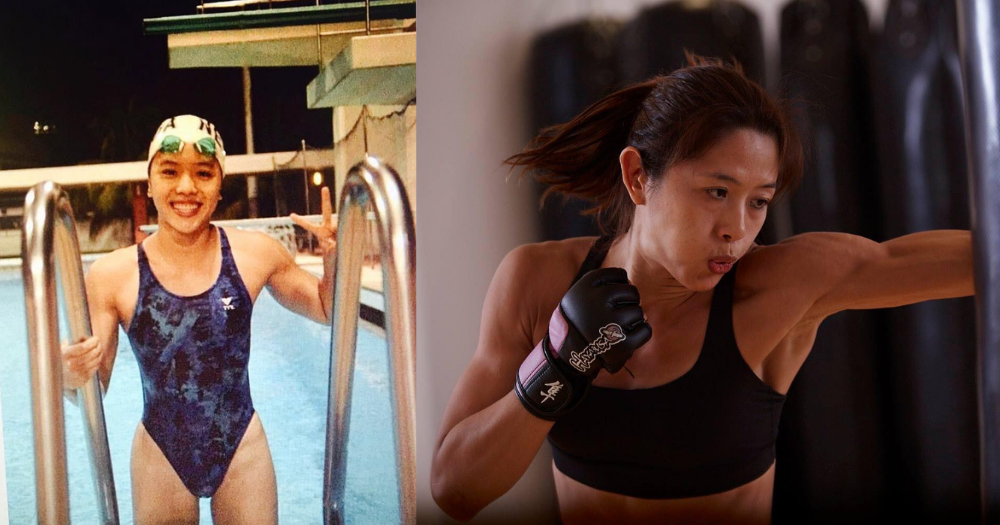Follow us on Telegram for the latest updates: https://t.me/mothershipsg
COMMENTARY: "Everybody loves a winner. But do we value our athletes enough to prop them up after their time has passed? Or are they consigned to the recesses of our memories?"
May Ooi is no stranger to the elite sporting scene in Singapore. At the age of 16, she competed in the 1992 Olympics in Barcelona, representing Singapore in seven different events in swimming. She later became professional MMA athlete, signed to ONE Championship, and represented the nation in Ju-Jitsu.
After retiring from combat competition, May was named team manager for Ju-Jitsu National Team and is appointed vice chairwoman of the Women & Sports Committee. She is also a board member of the Chiam See Tong Sports Fund, and owns a martial arts school teaching the Brazilian martial art Capoeira.
 Photo via Facebook / May Ooi.
Photo via Facebook / May Ooi.
"Passion Is Great, Professionalism Is Better" is an essay by Ooi, first published in The Birthday Book: Are We There Yet?, about her experience as an elite athlete and the need for better holistic support for Singapore's athletes, both during and after their prime competition years.
Mothership and The Birthday Collective are in collaboration to share a selection of essays from the 2021 edition of The Birthday Book.
The Birthday Book (which you can buy here) is a collection of essays about Singapore by 56 authors from various walks of life. These essays reflect on the narratives of their lives that define them, as well as Singapore's collective future.
By May Ooi
Sports in Singapore is like the appendix in the human body.
It’s an organ we are born with that serves no real purpose. It stays peacefully in our body until it decides to bring some attention to itself via appendicitis.
This usually ends with an appendectomy—surgeons remove the appendix and it’s no longer a nuisance.
Life goes on.
Importance of strong sporting community
I grew up in a vibrant sporting community. I was a latchkey kid and was home alone on weekdays.
My swimming routine gave me a daily structure. I made good friends, and the swimming community embraced me as an awkward kid who was quiet as a church mouse.
I grew up among great role models like Ang Peng Siong, David Lim, Oon Jin Teik and others. I learnt that being a champion is more than being the best at what you do. I learnt humility.
I was exposed to strong leaders who were not afraid to lead or shy away from tough situations. I learnt that the whole is greater than the sum of its parts.
Training was not exciting, but it was the best way to avoid doing homework. Attending local competitions also made procrastination easy.
Making the team and travelling to competitions was the best reason to skip school. Qualifying for an international competition meant getting to skip school, travel for free, hang out with friends and meet new people.
Obviously, I was doing it for all the wrong reasons.
But the swimming community embraced, supported, and elevated me as a young athlete. I took pride in being part of a community that had a tradition of producing champions and strong leaders. I was compelled to carry on the winning tradition.
It kept me motivated, elevated my game and before I knew it, I won my first Southeast Asian Games medal at the tender age of 13.
Lost many teammates to the paper dream
As I got older, I couldn’t help but notice I was losing my swimming friends. They simply stopped training.
By 16 years old, I was one of the most senior swimmers on the team.
The culprit behind the systemic culling of my teammates was the PSLE and the O-Levels.
The A-Levels was another great leveller where athletes with amazing talent were pressured by parents to “focus on their studies so you can find a good job” — a great formula to mediocrity.
Abandon your talent and be like everyone else. Practicality trumps Talent.
I have seen too many talented athletes leave the game to chase the promise of a paper dream. Sometimes I can’t help but wonder if part of my success in sports can be attributed to a sizeable number of my competitors falling off the grid.
I was the last one standing.
A leak in our pipeline
How do we keep our athletes in the game? How do we reconcile Talent with Practicality? Parents and athletes are concerned about losing the edge on job opportunities when they retire from competition.
Perhaps National Sport Associations (NSAs), Sport SG, Ministry of Culture, Community and Youth (MCCY) and corporate companies could work together to create a career pathway for national athletes competing at the major games level.
At the end of a competitive athletic career, these athletes could have an entry level job allocated to them in areas of their interest where they can earn a wage, get working experience, network and decide on the direction of their career path.
It’s a soft landing after years of hard work and sacrifices bringing glory and honour to Singapore.
Athletes who need to work and train could get some help landing jobs in companies, government bodies, or NSAs that can accommodate flexible working hours to complement training times.
Need corporate support for our athletes
For this to work, we’ll need corporate recognition where companies who appreciate sports are willing to lend support to local teams and clubs.
Japan is a sporting powerhouse in Asia. Their model is based on corporate ownership of sporting teams. Japanese companies own baseball, football, rugby, volleyball and other sporting teams.
This model is a win-win for sports teams and corporate companies. Sports teams get funding, a built-in fan base and a career pathway.
Retired athletes are channeled into entry level jobs in the corporate strata where they can deliberate on their future after a lifetime of competition and service to the country.
Active athletes get on the job training, understand the corporate structure and prepare themselves for work life after a competitive sports career.
When we can create a seamless pathway bridging the end of a sporting career to the start of a new work life, young athletes are likely to stay the course to fulfil their sporting potential. We effectively plug that leak in the pipeline and maintain a large talent pool to develop future champions.
Given time and opportunity, retired athletes would be more inclined to give back to sports as coaches, mentors and advisors because they have been well cared for by the system. We keep our past and present talents in the ecosystem to groom the next generation of athletes.
With time, a robust sporting culture sprouts with its roots deeply entrenched in service to society, honour to the country and hope for the future.
For our young athletes, there is a light at the end of the tunnel.
For the MNCs, they have choice picks of future employees who are hardworking, disciplined, focused and work well under pressure. In addition, corporate sponsored sports teams provide entertainment and opportunities for employees to bond through sporting events.
It’s organic team building on a corporate level using sports as a facilitator. Team spirit is intoxicating. It’s the glue that binds people, schools, communities, constituencies, states and countries together.
Japan has created a robust sporting culture by bridging sports from the grassroots, school, amateur and professional level to the corporate strata.
Can Singapore do the same or better?
In order for Singapore to be a sporting nation, need holistic support
A visit to the famed Kodokan Judo Institute of Japan in 2017 left a deep impression. It’s the HQ of the worldwide Judo community.
The operational and organisational requirements involved in overseeing a sport as globally popular as Judo are staggering.
The Kodokan is an eight story building and most of the space is used for managing the sport. One sport! With different tiers of international competitions and coordination with Olympic and other governing bodies, managing Judo requires a focused and professional effort.
In Singapore, NSAs are tasked with growing their respective sports, keeping a pulse on their grassroot communities, organising different tiers of competitions, events, and managing national athletes.
Most NSAs are run by passionate volunteers who invest time and energy to promote their sport. Although the volunteers are keen and eager to help, they may not have the necessary skills, time and consistent effort to operate an NSA efficiently.
In many instances, contributions by volunteers are herculean and noble. But the lack of consistency takes us back a couple of paces for every leap we make.
Leading Singapore into the future as a sporting nation requires a holistic, multi-agency approach. The stakeholders include families, local clubs, NSAs, MCCY, MNCs, MINDEF and most importantly, the people of Singapore.
Everybody loves a winner. But do we value our athletes enough to prop them up after their time has passed? Or are they consigned to the recesses of our memories?
How do we quantify the value of a home grown Olympic gold medallist? Priceless.
As the people of Singapore, do we see our athletes as assets that the country can rally around and leverage on? If it’s a resounding ‘Yes’, I think that is a good enough reason to invest in our own athletes so Singapore can celebrate and bask in their glory.
And just maybe, in the distant future, we might hear the Kallang Roar again.
Top photos via Facebook / May Ooi.
Follow and listen to our podcast here
If you like what you read, follow us on Facebook, Instagram, Twitter and Telegram to get the latest updates.
